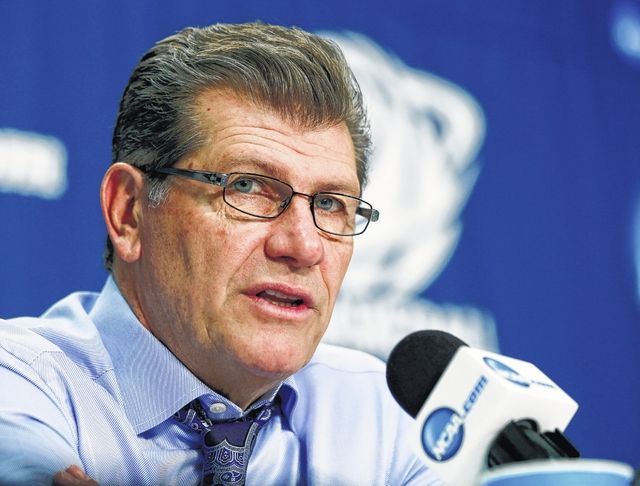Click here to subscribe today or Login.

TAMPA, Fla. — Four No. 1 seeds are in the Final Four of the women’s NCAA Tournament for only the third time, yet there’s still a distinctive feel it’s really two-time defending champion Connecticut’s title to lose. Notre Dame, South Carolina and Maryland merely are a distant best of the rest.
The coaches of the teams, beginning with UConn’s Geno Auriemma, say that’s simply not true.
The Huskies (36-1) may be playing on college basketball’s biggest stage for the eighth straight year and seeking a record 10th national title, but Auriemma said the best teams in the country are still standing, and all of them are capable of returning home with the championship trophy.
“We’re not going down there thinking that we’re so good that it doesn’t matter. … We don’t buy into this nonsense that we’re the only team that can win this thing, any more than I’m sure the rest of the country thinks Kentucky can’t lose in the men’s Final Four,” Auriemma said Wednesday on a conference call. “That’s not the case at all. Things happen in the Final Four that you just don’t expect.”
With All-American and two-time Final Four most outstanding player Brenna Stewart leading a talent-laden roster, UConn has won consecutive titles three times in program history. A 10th national crown would lift Auriemma into a tie with UCLA’s John Wooden for the most NCAA basketball championships.
But before the Huskies’ coronation, there’s a matter of beating Maryland (34-2) in Sunday’s semifinals and facing either Notre Dame (35-2) or South Carolina (34-2) on Tuesday night.
The Huskies beat Notre Dame by 18 in early December, trounced South Carolina 25 when the Gamecocks were unbeaten and ranked No. 1 in February, and have won 35 straight since suffering a two-point overtime loss at Stanford in November. Maryland hasn’t faced UConn this season.
If Terrapins coach Brenda Frese has the formula to end the Huskies’ reign, she’s not revealing it.
“It’s going to take a collective team effort. Obviously in that Stanford game, they did a tremendous job collectively as a team,” Frese said. “Defensively, they’re a great scoring team and you’ve got to be able to take some things away. And then you have to have your own team that’s gotta be able to keep pace in terms of being able to score.”
No team has had more success against UConn recently than former Big East rival Notre Dame and coach Muffet McGraw has the Irish in the Final Four for the fifth straight year.
The teams have faced each other 14 times over the past five seasons, with each winning seven.
McGraw understands why there’s a perception that there’s UConn — and then there’s everybody else. She just believes women’s college basketball has outgrown that scenario, even if the Huskies remain the most dominant program in the country.
“I think this is one of the best tournaments that we’ve had in terms of parity. I feel like there were so many great games,” McGraw said. “There were upsets. There were great games that the No. 1 seeds advanced. … I think that was great for TV.”
“I think we’re definitely heading in the same direction as the men. I think we had almost the same number of upsets on the first day as the men had,” she added. “And even though the top seeds advanced, which is unusual … it seems as though there’s definitely more parity and more excitement about the tournament.”
McGraw and the Irish will take on South Carolina, coached by Olympian and former WNBA star Dawn Staley. The Gamecocks are making their first Final Four appearance.
Regardless of who else makes the Final Four, Auriemma rejects the notion that UConn’s dominance has been bad for the sport.
To the contrary, he believes the attention the Huskies receive, and the standard they’ve set, have influenced more schools to commit to building strong programs capable of having success in the tournament.
“All the naysayers are going to say it’s bad. I’m sure half the people in women’s basketball want us to lose, maybe more than half,” Auriemma said. “Some maybe are just tired of it. Nothing we can do about that. … My players work just as hard, if not harder than anybody else.”





